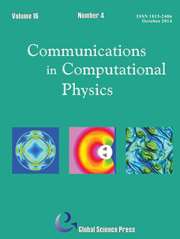Article contents
Computation of Hyperspherical Bessel Functions
Published online by Cambridge University Press: 06 July 2017
Abstract
In this paper we present a fast and accurate numerical algorithm for the computation of hyperspherical Bessel functions of large order and real arguments. For the hyperspherical Bessel functions of closed type, no stable algorithm existed so far due to the lack of a backwards recurrence. We solved this problem by establishing a relation to Gegenbauer polynomials. All our algorithms are written in C and are publicly available at Github [https://github.com/lesgourg/class_public]. A Python wrapper is available upon request.
MSC classification
- Type
- Research Article
- Information
- Copyright
- Copyright © Global-Science Press 2017
Footnotes
Communicated by Jie Shen
References
- 3
- Cited by


